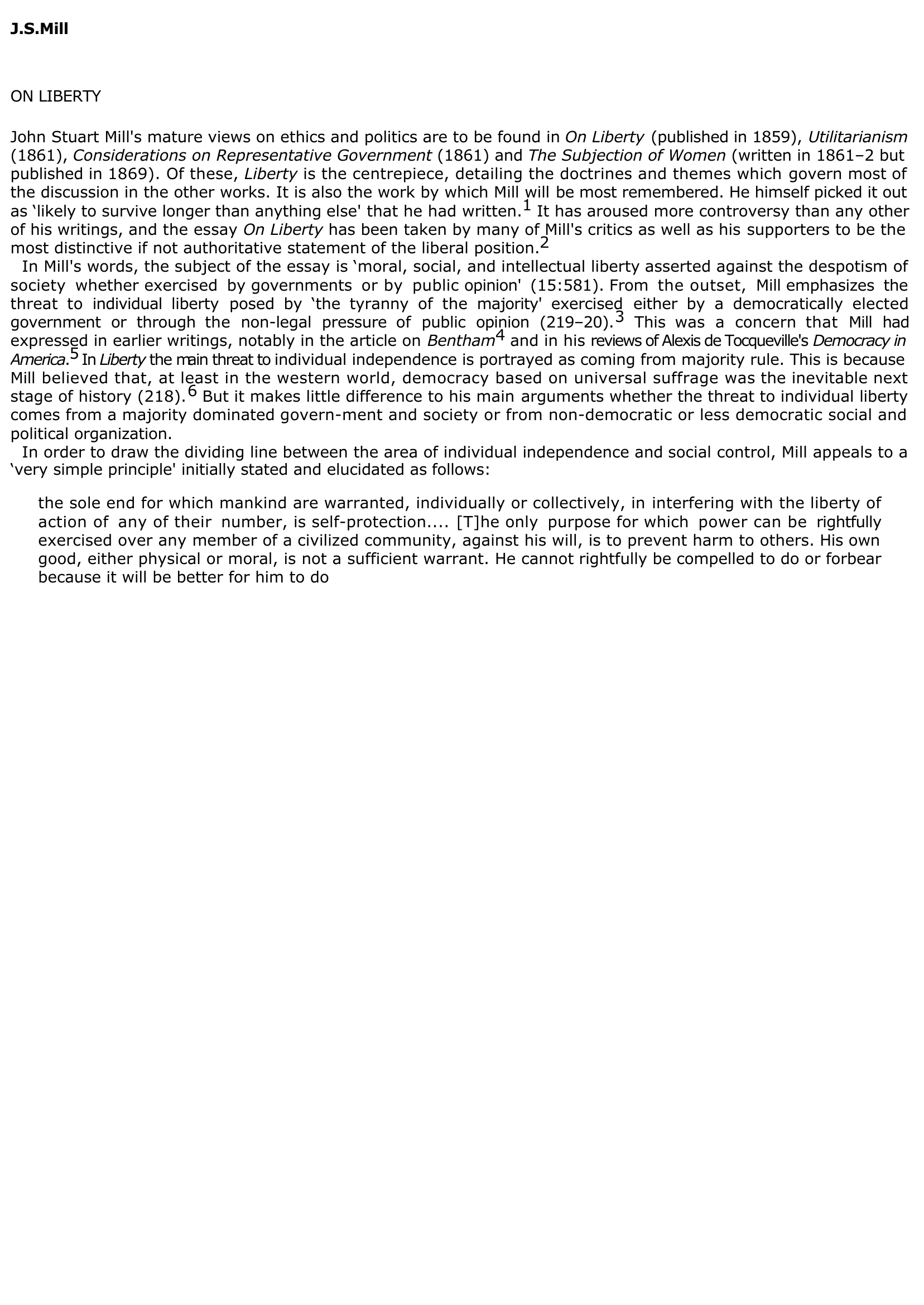Encyclopedia of Philosophy: J.S.Mill
Extrait du document
John Stuart Mill’s mature views on ethics and politics are to be found in On Liberty (published in 1859), Utilitarianism (1861), Considerations on Representative Government (1861) and The Subjection of Women (written in 1861–2 but published in 1869). Of these, Liberty is the centrepiece, detailing the doctrines and themes which govern most of the discussion in the other works. It is also the work by which Mill will be most remembered. He himself picked it out as ‘likely to survive longer than anything else’ that he had written. It has aroused more controversy than any other of his writings, and the essay On Liberty has been taken by many of Mill’s critics as well as his supporters to be the most distinctive if not authoritative statement of the liberal position.
«
J.S.Mill
ON LIBERTY
John Stuart Mill's mature views on ethics and politics are to be found in On Liberty (published in 1859), Utilitarianism
(1861), Considerations on Representative Government (1861) and The Subjection of Women (written in 1861–2 but
published in 1869).
Of these, Liberty is the centrepiece, detailing the doctrines and themes which govern most of
the discussion in the other works.
It is also the work by which Mill will be most remembered.
He himself picked it out
as ‘likely to survive longer than anything else' that he had written.1 It has aroused more controversy than any other
of his writings, and the essay On Liberty has been taken by many of Mill's critics as well as his supporters to be the
most distinctive if not authoritative statement of the liberal position.2
In Mill's words, the subject of the essay is ‘moral, social, and intellectual liberty asserted against the despotism of
society whether exercised by governments or by public opinion' (15:581).
From the outset, Mill emphasizes the
threat to individual liberty posed by ‘the tyranny of the majority' exercised either by a democratically elected
government or through the non-legal pressure of public opinion (219–20).
3 This was a concern that Mill had
expressed in earlier writings, notably in the article on Bentham4 and in his reviews of Alexis de Tocqueville's Democracy in
America.5 In Liberty the main threat to individual independence is portrayed as coming from majority rule.
This is because
Mill believed that, at least in the western world, democracy based on universal suffrage was the inevitable next
stage of history (218).
6 But it makes little difference to his main arguments whether the threat to individual liberty
comes from a majority dominated govern-ment and society or from non-democratic or less democratic social and
political organization.
In order to draw the dividing line between the area of individual independence and social control, Mill appeals to a
‘very simple principle' initially stated and elucidated as follows:
the sole end for which mankind are warranted, individually or collectively, in interfering with the liberty of
action of any of their number, is self-protection....
[T]he only purpose for which power can be rightfully
exercised over any member of a civilized community, against his will, is to prevent harm to others.
His own
good, either physical or moral, is not a sufficient warrant.
He cannot rightfully be compelled to do or forbear
because it will be better for him to do.
»
↓↓↓ APERÇU DU DOCUMENT ↓↓↓
Liens utiles
- Encyclopedia of Philosophy: Bentham and James Mill
- Encyclopedia of Philosophy: THE CRito of Plato
- Encyclopedia of Philosophy: Albert the Great
- Encyclopedia of Philosophy: Sidgwick
- Encyclopedia of Philosophy: Alexander of Aphrodisias

































